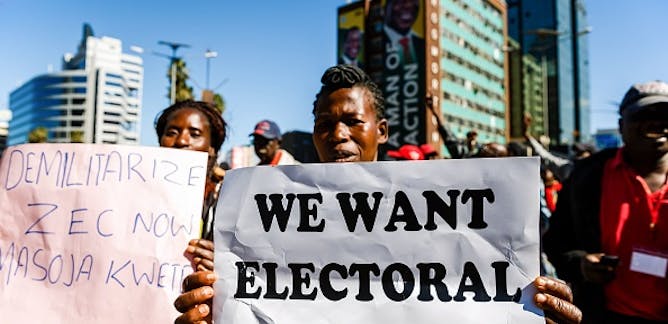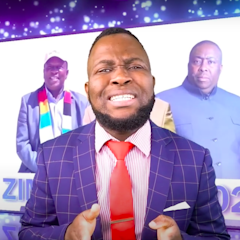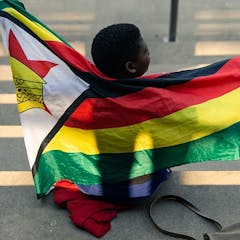
Articles on Emmerson Mnangagwa
Displaying 1 - 20 of 75 articles

Zimbabwe’s 2023 elections look like their predecessors: stolen. But this one is a bit different. Opposition strategies and regional responses have changed too. What does this mean for the future?

Women’s representation in Zimbabwe’s parliament has declined in spite of a quota imposed in 2013.

Nelson Chamisa defines himself as a social democrat who believes in providing substantial welfare to support healthcare and basic education.

Taffy Theman and Bustop TV are YouTubers who use comedy to criticise the ruling elite.

President Emmerson Mnangagwa has not faced official investigation or prosecution over his role in Operation Gukurahundi – 40 years on.

Writers have challenged oppression, exposed social injustices and advocated for political change.

Opposition activists have previously been accused of treason and unpatriotic behaviour for expressing concerns about human rights abuses.

Novelist Petina Gappah’s call for translators on Facebook has resulted in the publication of Chimurenga Chemhuka.

Zanu-PF’s anti-American rhetoric is not only deployed to win friends abroad. As elections approach, it is also a prominent campaign tactic at home.

In his music, he positions himself within the people’s struggles and identifies with them.

Playing out in an animal kingdom, Glory is a devastating political commentary on Zimbabwe today.

Informal sector organisations in Zimbabwe have the potential to influence politics at a personal and societal level.

The award-winning documentary - now on in South Africa - follows opposition leader Nelson Chamisa. But it spends too much time in meetings instead of giving insight into the bigger picture.

The more President Mnangagwa’s government fails to engage democratically with its own citizens, the more it will negate any prospect of re-engagement with the West.

A forensic archaeologist and former Zimbabwe police officer uses his investigative skills to find the missing and the dead in his homeland.

The time is long past that Pretoria’s admonitions of bad behaviour by Zimbabwe’s leaders are backed by a credible threat of sanction and punishment.

Zimbabwe wants to issue a sovereign bond to raise $3.5 billion it has agreed to pay as compensation to white farmers, but the economic and political conditions aren’t conducive to such an issuance.

Artists are filling the state’s silence by revisiting history so that it can be discussed.

Sexist slandering has been used not just to describe Grace Mugabe, but to denigrate any women who aspire to political positions.

The current lockdown in Zimbabwe is going to provide a stern test for its informal economy, which is the country’s dominant economy and employs 90% of people.





